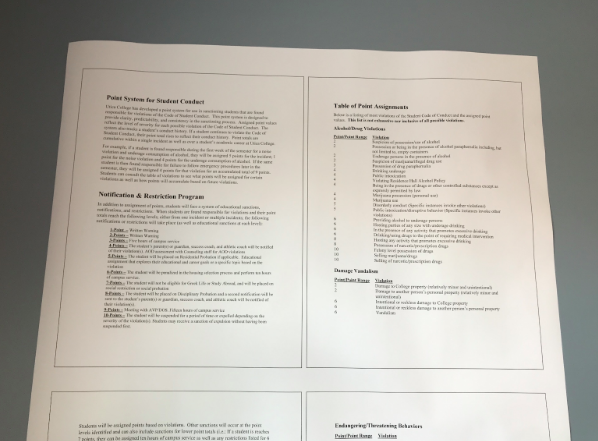Utica College has wiped away the old system of documenting student conduct and created a new point system. Its purpose is to become more effective in holding students accountable for their actions and to educate them on poor decisions.
Carl Lohmann, director of student conduct and community standards, had a hand in helping create the new system.
“The new point system is for use in sanctioning students that are found responsible for violations of the Code of Student Conduct,” he said. “Assigned point values reflect the level of severity for each possible violation of the Code of Student Conduct.”
Lohmann also explained that the new point system will track a student’s history of conduct if they have been in trouble in the past.
“If a student who has been at Utica College prior to the point system being instituted violates the Code of Student Conduct and is found responsible,” Lohmann said. “Then we will have a conversation and arrive at a point total based on their past violations, what they have learned from past violations and the time since their past violation.”
When a student’s point total reaches a certain level, consequences may include educational sanctions, notifications, punitive measures or restrictions.
Lohmann said this new system was developed after evaluating various schools to see how they handled their student code of conduct. Those methods were tailored to fit UC’s student community.
“We reached out and got input from the systems and conduct administrators at Bucknell University, Gettysburg College, Hendrix College, Colgate University, Hamilton College and Union College,” Lohmann said.
Dean of Students Timothy Ecklund also played a role in creating this new system and emphasized that students will be able to work points off if they were to get in trouble.
“The best part of the program and what I’m most excited about is that it will allow students to work points off and we didn’t have with the old program,” he said. “The lingo is called ‘restorative,’ where you can give back after you’ve taken away by violating something in the community.”
Students can have two points removed from their record after 90 days with no violations and if they perform an approved community service project off-campus. The system also allows a one-point reduction if students complete an alcohol education program after an incident involving alcohol or drugs.
Ecklund also explained that the system was changed because of feedback from students and to make it more objective.
“The student body had felt like there was too much subjectivity in the system that we were currently operating out of,” he said. “So we decided that we should look at how other institutions operate when it comes to student conduct.”
Ecklund said this system works well in other institutions and it seemed to make sense to implement it at UC. He believes it will also be more effective because students will know about the consequences and it is much more predictive.
Junior Elizabeth Darling said she expects the new system to be less effective. The old system of documentation was more serious, according to Darling.
“If you were to get documented, you have to meet with your area coordinator or your resident assistant and you have to do something such as writing a paper for whatever you did wrong,” Darling said. “I feel like some people will be ‘whatever’ if they get a point because it doesn’t seem as serious.”
The new point system takes into account the subjectivity of the violation. Darling said she believes that some of the points for certain violations are unfair.
“Obviously more subjective violations are going to have higher points but lower ones, like setting the fire alarm off is still three points, which I think is a lot because sometimes setting it off is a mistake,” she said.
Junior Kelly Meadesaid she doubts the effectiveness of the new student conduct system.
“I think it’s still too early to tell but I feel like it has more of a consequence so it might be,” Meade said. “But at the end of the day, I don’t think it’s going to stop students from violating the rules, such as drinking.”






































































































































